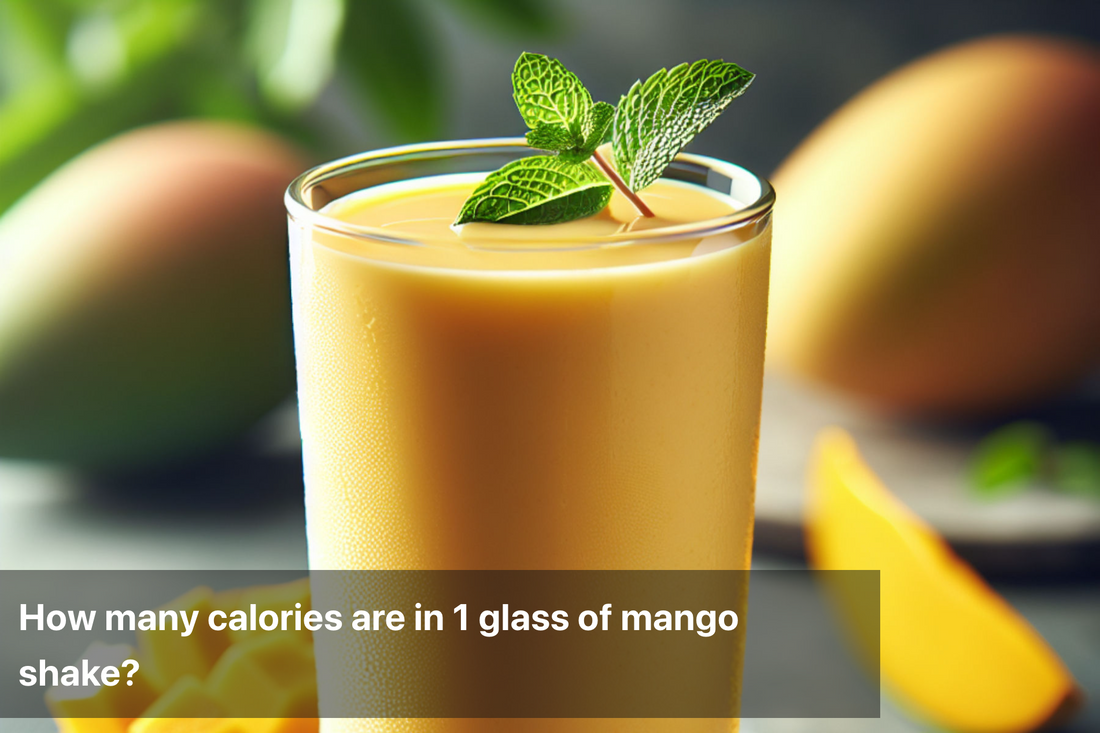
How many calories are in 1 glass of mango shake?
Share
Mango shake is one of the most popular summer beverages—creamy, sweet, and irresistibly tropical. It’s commonly found in cafes, juice centers, and homemade kitchens across India during mango season. But if you’re watching your calorie intake or trying to manage your weight, you might wonder just how much indulgence is in that golden glass.
Let’s break down the calorie count, nutritional value, influencing factors, and tips to enjoy mango shake in a balanced, health-conscious way.
Average Calorie Count of a Standard Mango Shake
A standard homemade mango shake (approx. 250–300 ml) made with full-fat milk and sugar contains around:
Calories: 220–280 kcal
Carbohydrates: 40–50g
Natural sugars (from mango): 25–30g
Added sugar: 10–15g (1–2 tsp)
Protein: 5–6g
Fat: 5–7g (depending on milk type)
Fiber: 1–2g
This calorie range can change significantly depending on the ingredients and serving size.
Calories in Different Mango Shake Variations (Per 1 Glass / 300ml)
Type of Mango Shake |
Calories |
Sugar (g) |
Fat (g) |
Protein (g) |
|---|---|---|---|---|
With full-fat milk + sugar |
260–280 |
40–45 |
6–8 |
5–6 |
With toned milk + sugar |
210–230 |
38–42 |
3–5 |
5 |
With skimmed milk, no sugar |
160–180 |
28–32 |
1–2 |
5 |
With almond milk (unsweetened) |
150–170 |
25–30 |
2–3 |
2 |
With ice cream or malai (thick) |
300–350 |
50+ |
10+ |
6–8 |
These values are approximate and depend on portion size, mango variety, and any added ingredients like dry fruits or cream.
Key Factors That Influence Calorie Count
1. Mango Variety Used
Some mangoes are naturally sweeter and pulpier than others.
Alphonso (Hapus): High in sugar, rich in pulp
Kesar: Medium sweet, less dense than Alphonso
Totapuri: Tangier, with less sugar
Banganapalli: Firm and balanced in sweetness
Using sweeter mangoes reduces the need for added sugar.
2. Type of Milk
Milk makes up a major portion of the calorie load.
Full-fat milk: ~150 kcal per cup
Toned milk: ~100–120 kcal
Skimmed milk: ~80–90 kcal
Plant-based milk: 30–100 kcal, depending on type and brand
Choosing low-fat or plant-based milk can reduce overall calories without drastically changing the taste.
3. Added Sugar or Sweeteners
A single teaspoon of sugar = 20 kcal. Most store-bought shakes add 2–3 tsp or use sugar syrups.
To reduce calories:
Skip added sugar altogether
Use natural sweeteners like dates or stevia
Rely on the mango’s natural sweetness
4. Toppings and Add-Ons
Many cafes and home recipes add dry fruits, cream, or even ice cream on top, increasing the calorie density.
Ice cream scoop: +100–150 kcal
Cashews and almonds: +50–70 kcal per tbsp
Malai or thick cream: +80–100 kcal per 2 tbsp
These additions can push your shake beyond 400 kcal if not portioned mindfully.
Is Mango Shake Healthy?
Mango shake can be both nutritious and calorie-dense.
Pros:
Rich in vitamin A, vitamin C, and antioxidants
Provides energy and hydration in hot weather
Natural fruit sugar (fructose) instead of refined sweeteners
Good source of calcium and protein if made with milk
Cons (if over-consumed):
High in sugar and carbs
Can spike blood sugar quickly
Often consumed in large quantities
May hinder weight loss if not balanced within daily intake
How to Make a Low-Calorie Mango Shake at Home
Want all the taste without the extra calories? Try this lighter version:
Ingredients:
1 medium ripe mango (150g pulp)
¾ cup chilled skimmed or almond milk
1 tsp chia seeds (optional)
Ice cubes
No added sugar
Method:
Blend all ingredients till smooth.
Serve immediately, optionally topped with mint.
Calories: ~160–180 kcal per serving
Bonus: High fiber + protein + no refined sugar
Best Time to Have Mango Shake
Post-workout: Replenishes energy and aids muscle recovery
Mid-morning snack: Prevents overeating at lunch
Not ideal late evening or night due to high sugar and calorie content
Always consume it in moderation and adjust other meals to keep your daily calories in check.
Summary
One glass of mango shake can range from 150 to over 350 calories, depending on how it’s made. While it’s packed with vitamins and tropical flavor, it can also be sugar-heavy and calorie-dense if consumed carelessly. By choosing the right ingredients and portion sizes, mango shake can be enjoyed as a refreshing, nutrient-rich treat—even on a weight-conscious diet.






